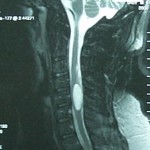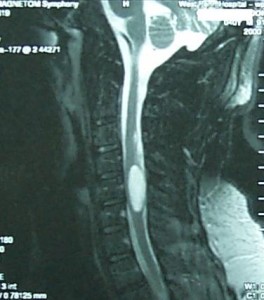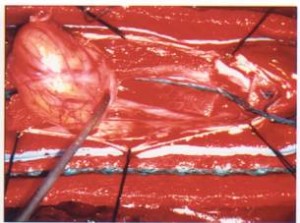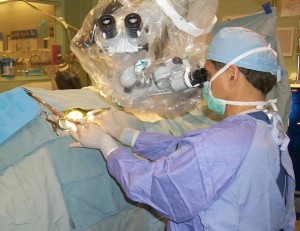Spinal Cord Tumors
 Summary:
Summary:- Spinal Cord Tumors can be Treated
- Early Identification is Important
- Surgery is done Minimally Invasive
What is it?
 Spinal cord tumors can occur in any part of the spinal column and can cause significant neurological and functional impairment. Luckily, they are comparatively rare. Improved early testing with diagnostic tools such as MRI and CT scans made it possible to diagnose spinal cord tumors earlier, and earlier discovery directly translates to quicker intervention, typically with surgery. A quicker intervention can help to minimize their potentially devastating effects. Microsurgical techniques and other specialized treatments are used to remove these tumors.
Spinal cord tumors can occur in any part of the spinal column and can cause significant neurological and functional impairment. Luckily, they are comparatively rare. Improved early testing with diagnostic tools such as MRI and CT scans made it possible to diagnose spinal cord tumors earlier, and earlier discovery directly translates to quicker intervention, typically with surgery. A quicker intervention can help to minimize their potentially devastating effects. Microsurgical techniques and other specialized treatments are used to remove these tumors.
What are the Types of Tumors?
Spinal tumors can be malignant (cancerous) or benign. Both types can occur within the various layers of the spinal cord:
- Extradural– Those tumors outside the dural covering of the spinal cord.
- Intradural extramedullary – Those tumors inside the dural covering but not within the spinal cord itself.
- Intradural intramedullary – Those tumors inside the dural covering and within the spinal cord itself.
Prevalence and facts about spinal cord tumors:
- Spinal tumors occur in approximately 1.1 out of 100,000 persons.
- Approximately 15-20% of all central nervous system (CNS) tumors occur in the spine.
- They can occur in both the pediatric and adult population.
- They are found most frequently in the thoracic cord (middle of the back), but can also occur in the cervical spine or the lumbar spine.
- The tumor can arise from any component of the spinal cord.
- 90% of spinal tumors are benign and therefore a surgical “cure” is possible.
- Many are slow growing and take years to cause problems.
- These spinal tumors can be difficult to diagnose and are occasionally missed in their early stages because of their tendency to mimic other conditions (e.g. back pain from strains or other traumatic injuries).
What are their Symptoms and Signs?
 Pain is the usual presentation and this is classically thought to be worse when the patient is supine or laying down flat. Pain usually radiates to other parts of the body (arm or leg) because these nerves and nerve roots in the cord are being pressed on by the tumor mass. Eventually, weakness and abnormal sensations will follow as the tumor advances and finally the bladder and bowel will begin to lose normal function. During this time, walking will become difficult and paralysis may then rapidly occur.
Pain is the usual presentation and this is classically thought to be worse when the patient is supine or laying down flat. Pain usually radiates to other parts of the body (arm or leg) because these nerves and nerve roots in the cord are being pressed on by the tumor mass. Eventually, weakness and abnormal sensations will follow as the tumor advances and finally the bladder and bowel will begin to lose normal function. During this time, walking will become difficult and paralysis may then rapidly occur.
What are the Treatments?
If surgery is indicated the goal will be to safely remove as much tumor as possible while preserving the neurological function that is present prior to surgery. Even with a successful outcome there is still a possibility of re-occurrence; therefore, these patients will usually require lifelong monitoring with MRIs. Radiation therapy and chemotherapy are usually of little help with tumors of the spine but some treatment protocols are offered for specific cases.
What are some of the Surgical Risks?
The possible risks from spinal cord tumor surgery will be reviewed with you and your family prior to surgery. Spinal tumor surgery is a very serious and potentially consequential surgery, and both risks and benefits must be well considered. Spinal fluid leaks, due to the fact that the dural or outer sac around the spinal cord may open up again after surgery, are somewhat common and can be treated with either prolong bed rest or a spinal fluid drain. In rare cases, paralysis and/or loss of bladder, bowel or sexual function can occur. Recovery after this type surgery may include aggressive physical therapy in order to regain lost function due to the tumor compression. Cord swelling after surgery is not unusual, which can temporarily cause symptoms to get worse immediately following surgery. Often, medications such as steroids are used to decrease nerve tissue swelling and help to decompress the nerve.
Tri-State Neurosurgical Associates-UPMC
Administrative Oakland Office Address:
Presbyterian University Hospital
Department of Neurosurgery
Suite 5C
200 Lothrop Street
Pittsburgh, PA 15213
Phone: 1-888-234-4357
© 2013 Tri-State Neurosurgical Associates – UPMC




 Dr. Maroon received an athletic scholarship to Indiana University in Bloomington, Indiana where as an undergraduate, he was named a Scholastic All-American in football. Dr. Maroon has successfully maintained his personal athletic interests through participation in 9 marathons and more than 72 Olympic-distance triathlon events. However, his greatest athletic accomplishment is his participation in 8 Ironman triathlons (Hawaii – 1993, 2003, 2008, 2010, 2013; Canada – 1995; New Zealand – 1997; Germany – 2000), where he usually finishes in the top 10 of his age group. Recently, in July 2012 and 2013, he finished second and third, respectively, in his age group in the Muncie, Indiana half Ironman triathlon. In October 2013 he completed his 5th World Championship Ironman in Kona, Hawaii.
Dr. Maroon received an athletic scholarship to Indiana University in Bloomington, Indiana where as an undergraduate, he was named a Scholastic All-American in football. Dr. Maroon has successfully maintained his personal athletic interests through participation in 9 marathons and more than 72 Olympic-distance triathlon events. However, his greatest athletic accomplishment is his participation in 8 Ironman triathlons (Hawaii – 1993, 2003, 2008, 2010, 2013; Canada – 1995; New Zealand – 1997; Germany – 2000), where he usually finishes in the top 10 of his age group. Recently, in July 2012 and 2013, he finished second and third, respectively, in his age group in the Muncie, Indiana half Ironman triathlon. In October 2013 he completed his 5th World Championship Ironman in Kona, Hawaii.